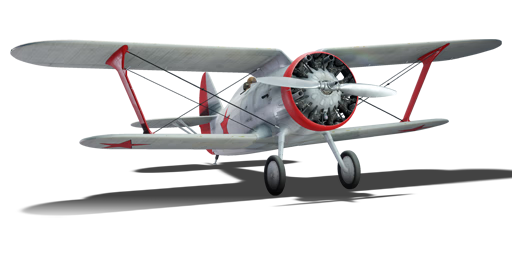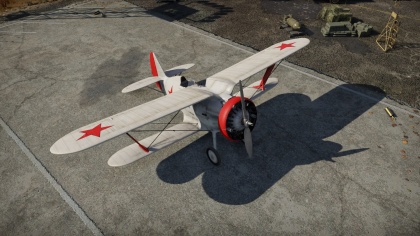I-15 M-25
Contents
| This page is about the Russian fighter I-15 M-25. For other uses, see I-15 (Family). |
Description
The I-15 M-25 is a rank Russian fighter
with a battle rating of (AB), (RB), and (SB). It has been in the game since the start of the Open Beta Test prior to Update 1.27.
General info
Flight Performance
Describe how the aircraft behaves in the air. Speed, manoeuvrability, acceleration and allowable loads - these are the most important characteristics of the vehicle.
| Characteristics | |||||||
|---|---|---|---|---|---|---|---|
| Stock | |||||||
| Max Speed (km/h at 3,000 m) |
Max altitude (meters) |
Turn time (seconds) |
Rate of climb (meters/second) |
Take-off run (meters) | |||
| AB | RB | AB | RB | AB | RB | ||
| 358 | 348 | 8.1 | 8.7 | 10.5 | 10.5 | 125 | |
| Upgraded | |||||||
| Max Speed (km/h at 3,000 m) |
Max altitude (meters) |
Turn time (seconds) |
Rate of climb (meters/second) |
Take-off run (meters) | |||
| AB | RB | AB | RB | AB | RB | ||
| 379 | 368 | 7.9 | 8.0 | 16.9 | 13.4 | 125 | |
Details
| Features | ||||
|---|---|---|---|---|
| Combat flaps | Take-off flaps | Landing flaps | Air brakes | Arrestor gear |
| ✓ | X | X | X | X |
| Limits | ||||
|---|---|---|---|---|
| Wing-break speed (km/h) |
Gear limit (km/h) |
Combat flaps (km/h) |
Max Static G | |
| + | - | |||
| 520 | ~11 | ~4 | ||
| Optimal velocities | |||
|---|---|---|---|
| Ailerons (km/h) |
Rudder (km/h) |
Elevators (km/h) |
Radiator (km/h) |
| < 180 | < 360 | < 260 | > 180 |
| Compressor (RB/SB) | ||
|---|---|---|
| Setting 1 | ||
| Optimal altitude | 100% Engine power | WEP Engine power |
| 1,000 m | 570 hp | N/A |
Survivability and armour
Examine the survivability of the aircraft. Note how vulnerable the structure is and how secure the pilot is, whether the fuel tanks are armoured, etc. Describe the armour, if there is any, and also mention the vulnerability of other critical aircraft systems.
Armaments
Offensive armament
The I-15 M-25 is armed with:
- 4 x 7.62 mm PV-1 machine guns, nose-mounted (750 rpg = 3,000 total)
Suspended armament
The I-15 M-25 can be outfitted with the following ordnance:
- Without load
- 2 x 50 kg FAB-50 bombs (100 kg total)
Usage in battles
Describe the tactics of playing in an aircraft, the features of using vehicles in a team and advice on tactics. Refrain from creating a "guide" - do not impose a single point of view, but instead, give the reader food for thought. Examine the most dangerous enemies and give recommendations on fighting them. If necessary, note the specifics of the game in different modes (AB, RB, SB).
Manual Engine Control
| MEC elements | ||||||
|---|---|---|---|---|---|---|
| Mixer | Pitch | Radiator | Supercharger | Turbocharger | ||
| Oil | Water | Type | ||||
| Controllable | Not controllable Not auto controlled |
Not controllable Not auto controlled |
Controllable Not auto controlled |
Separate | Not controllable 1 gear |
Not controllable |
Modules
| Tier | Flight performance | Survivability | Weaponry | |
|---|---|---|---|---|
| I | Fuselage repair | Radiator | Offensive 7 mm | |
| II | Compressor | New 7 mm MGs | ||
| III | Wings repair | Engine | Airframe | DZ-40 |
| IV | Cover | |||
Pros and cons
Summarise and briefly evaluate the vehicle in terms of its characteristics and combat effectiveness. Mark its pros and cons in the bulleted list. Try not to use more than 6 points for each of the characteristics. Avoid using categorical definitions such as "bad", "good" and the like - use substitutions with softer forms such as "inadequate" and "effective".
Pros:
Cons:
History
Describe the history of the creation and combat usage of the aircraft in more detail than in the introduction. If the historical reference turns out to be too long, take it to a separate article, taking a link to the article about the vehicle and adding a block "/ History" (example: https://wiki.warthunder.com/(Vehicle-name)/History) and add a link to it here using the main template. Be sure to reference text and sources by using <ref></ref>, as well as adding them at the end of the article with <references />. This section may also include the vehicle's dev blog entry (if applicable) and the in-game encyclopedia description (under === In-game description ===, also if applicable).
In-game description
Polikarpov I-15 (TsKB-3) single-engine fighter, produced in 1935
The launch of the Soviet licensed version of the Wright Cyclone SGR-1820 engine, under the designation M-25, was quite drawn out; therefore, a majority of production I-15s were equipped with M-22 (a licensed version of the British Bristol Jupiter VI) nine-cylinder, air-cooled engines, whose rated power was only 480 hp. This significantly worsened the plane's flight characteristics.
Aircraft from the final production series had M-25 engines. In addition, they had one more pair of 7.62 mm synchronous PV-1 machine guns.
Most I-15s had fixed-pitch propellers, but some machines received VISh-6 controllable-pitch propellers.
In Spain, in the autumn of 1936, the I-15 fighter was used for the first time in the field. The first air battle involving an I-15 took place on November 4. A total of 186 I-15 fighters were received by the Republicans from the USSR.
I-15 fighters were also used in the Khalkhyn Gol frontier conflict, in the Winter War of 1939-40, and even during the initial period of World War II (mainly as ground-attack aircraft). However, the plane was considered obsolete even by the Battle of Khalkhyn Gol.
Stable and handy, with good flight characteristics, exceptional manoeuvrability, and excellent takeoff/landing parameters, the I-15 fighter enjoyed a well-deserved success among pilots.
Some I-15 fighters were used as personal command vehicles. For example, a drawing of a flying red banner with the words "FOR VKP (B)", i. e. "For the All-Union Communist Party (of Bolsheviks)", was applied to the fuselage of the personal I-15 of Brigade Commander I. U. Pavlov, and a bent white arrow directed down was painted on the red rudder. The metal skin of the nose fuselage was polished in a frost pattern.
On November 21, 1935, the test pilot V. K. Kokkinaki established the world's unofficial (as the USSR was not yet a member of the FAI) flight altitude record of 14,575 m while flying a special TsKB-3 with a reduced weight.
The I-15's manoeuvrability was excellent, and its short fuselage and large control surfaces ensured the fighter's agility. Not a single major rival of the I-15 in Spain (neither the German He 51 fighter nor the Italian CR.32) was its equal in these characteristics.
The I-15's full-scale production was discontinued in 1936. A total of 384 aircraft were manufactured at Factories No. 1 and No. 39 from 1934-36. In addition, 291 more aircraft were built under licence in Republican Spain.
Media
Excellent additions to the article would be video guides, screenshots from the game, and photos.
See also
Links to the articles on the War Thunder Wiki that you think will be useful for the reader, for example:
- reference to the series of the aircraft;
- links to approximate analogues of other nations and research trees.
External links
Paste links to sources and external resources, such as:
- topic on the official game forum;
- encyclopedia page on the aircraft;
- other literature.
| USSR fighters | |
|---|---|
| I-15 | I-15 WR · I-15 M-22 · I-15 M-25 · I-15bis · Krasnolutsky's I-15bis |
| I-153 M-62 · Zhukovsky's I-153-M62 · I-153P | |
| I-16 | I-16 type 5 · I-16 type 10 · I-16 type 18 · I-16 type 24 · I-16 type 27 · I-16 type 28 · I-180S |
| I-29 | I-29 |
| I-185 | I-185 (M-71) · I-185 (M-82) |
| I-225 | I-225 |
| ITP | ITP (M-1) |
| MiG-3 | MiG-3-15 · MiG-3-15 (BK) · MiG-3-34 |
| LaGG | I-301 · LaGG-3-4 · LaGG-3-8 · LaGG-3-11 · LaGG-3-23 · LaGG-3-34 · LaGG-3-35 · LaGG-3-66 |
| La | La-5 · La-5F · La-5FN · La-7 · Dolgushin's La-7 · La-7B-20 · La-9 · La-11 |
| Yak-1/7 | Yak-1 · Yak-1B · Yak-7B |
| Yak-3 | Yak-3 · Eremin's Yak-3(e) · Yak-3P · Yak-3T · Yak-3U · Yak-3 (VK-107) |
| Yak-9 | Yak-9 · Yak-9B · Golovachev's Yak-9M · Yak-9T · Yak-9K · Yak-9U · Yak-9UT · Yak-9P |
| Other countries | ▂P-40E-1 · ▂P-47D-27 · ▂Hurricane Mk IIB · ▂Fw 190 D-9 · ▂Spitfire Mk IXc |
| P-39 | ▂P-39K-1 · ▂Pokryshkin's P-39N-0 · ▂P-39Q-15 |
| P-63 | ▂P-63A-5 · ▂P-63A-10 · ▂P-63C-5 |





